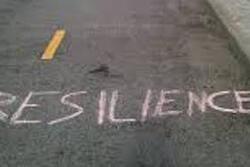Not Your Average Grandma
Many people view grandmothers as sweet, docile old ladies, whose sole purposes are to bake cookies and knit sweaters for their grandchildren. While it’s true that my Grandma Brenda does greatly enjoy spoiling and feeding her grandchildren, there’s so much more to her story.
My grandma’s father died when she was young, and she grew up in a house full of women as the youngest of three daughters. She lived in a low-rent government housing project in New Jersey until age 13, but her childhood was relatively happy considering the circumstances. She once told me: “I never felt poor because I never knew any other way of life. We always had plenty of food and plenty of love.” These years were humble—so humble, in fact, that there was no time or money for Judaism in her household. She knew almost nothing about her religion—she had never gone to temple, never celebrated a Jewish holiday, and didn’t know a thing about the state of Israel. Later in life, my grandma would ask her mother Bessie why Judaism was absent in those early years. My great grandmother Bessie would always reply jokingly that with three little girls, she was worried that one of her daughters’ curls would catch on fire if she so much as lit Shabbat candles. The fact of the matter was that practicing Judaism was a luxury that their family simply did not have time for and could not afford.
My grandma moved to Springfield, Massachusetts following the death of her maternal grandfather, who left her mother and uncle a modest two-family house in that city. The house was, admittedly, nicer than her previous home in Newark’s projects, but my grandma recalls those years as much more painful than her early childhood. As my peers and I know very well, high school is often a time filled with academic pressures and social stress. For my grandma, it was all of that times ten. Starting at age 13, she had to work around the clock to help support her struggling family. Her mother Bessie would call the school and get her excused from her last two periods of the day so she could go straight from lunch to her afternoon job at a plumbing supply store. This was followed by babysitting every night, and weekend work at her uncle’s scrap metal store. She was self-conscious in high school about her old hand-me-down clothes, and the fact that she couldn’t afford (and didn’t have time) to participate in many of her classmates’ social activities.
Despite her hectic life, Brenda received good grades in high school and started at a local college with a one-semester scholarship. After the money ran out, however, she had to return home, with no funds left to continue her college education. She took on more jobs, and soon met my grandpa—who had had a difficult childhood himself, and like her, came from a completely secular background. They married when she was just 19, moved to the suburbs, and continued leading assimilated secular lives.
They lived like this until Israel was attacked by its neighbors in the Six-Day War . This was a transformative experience in my grandmother’s life. She still vividly remembers what my grandfather said the evening the war broke out: “The Jewish people are going to be annihilated—they’ll be slaughtered. American Jews have to do something.” My grandparents rushed to the local JCC and worked in a frenzy for three straight days to raise money for arms, planes, and infrastructure to help support Israel’s defense.
The Six-Day War helped my grandma discover her Jewish identity—not an observant, religious identity— but a Zionist one. She realized she felt strongly that all Jews should have a safe and welcoming homeland. After her tireless work during the Six-Day War, she and my grandfather were invited to join a young leadership group of Springfield’s Jewish Federation. Over the next several decades, she and my grandpa devoted countless hours of work and made significant donations to the Federation and to other organizations to support Israel and the Jewish community. Grandma Brenda even donated a 1-carat diamond ring during the Yom Kippur War to help the war effort—one of my personal favorite stories. Wanting her children to get the Jewish education she missed out on, she enrolled them in the local Jewish Day School, despite her still-secular mother’s skepticism.
Since my grandma first discovered Zionism in 1967, she has visited Israel 23 times, and she claims each trip is better than the last. Most of these trips have been Federation missions, which are packed with educational speeches and visits to local beneficiaries of Federation dollars. My grandma often tells me a story about a trip in the 80’s, when she and my grandfather waited on the runway at Ben Gurion Airport in the middle of the night to welcome the new “olim” (immigrants to Israel) from Russia. My grandma always cries as she describes the elderly Jews getting off the plane, sometimes carrying Torahs, and kissing the ground as they first step foot on Israeli soil. Of course my personal favorite of her 23 trips was the one I got to go on. In honor of my grandparents’ 50th anniversary, they took my entire extended family to Israel. We ranged in age from 7 to 78, and my first experience in Israel was all the more amazing because I got to share first-hand in my grandma’s passion for the country.
Nowadays, my grandma continues to support Israel. Her view of Israel is, of course, not black and white; it’s a nuanced vision. She doesn’t always agree with the Prime Minister Netanyahu’s stances, she believes strongly in a two-state solution, and is against the building of settlements. However, my grandma remains unwavering in her belief that there should be a safe and peaceful Jewish homeland. Even now at the age of 77, she takes courses on the Middle East at a local college to remain informed about Israel’s current political situation.
One more thing about Grandma Brenda: although she never learned what the word “feminism” meant until later in life, she has always been a great female role model in my life. In an era when women in upper-class suburbia were often limited to being mothers and wives, my grandma broke these boundaries by additionally working passionately as a philanthropist and activist. My grandma’s journey from a struggling secular childhood to an adulthood marked by a strong Jewish identity and passion for Israel, makes Grandma Brenda one of the most inspirational Jewish ladies I will ever know.
This piece was written as part of JWA’s Rising Voices Fellowship.







